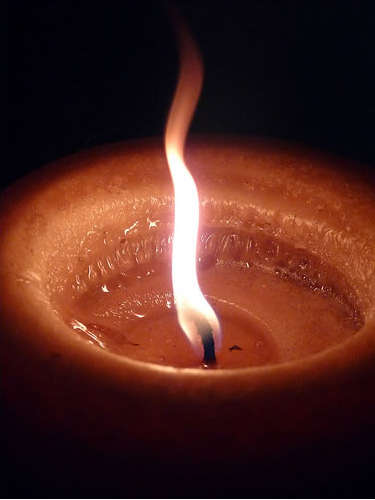FWP:
This verse shows how seriously the other commentators take the pronouncements of Nazm. Often they simply adopt his views, but when he says something unduly critical they tend to react strongly. His declaring the address to the flame unpleasing causes Bekhud Dihlavi to pointedly say the opposite, and Bekhud Mohani to disagree with Nazm in so many words. That's one reason (though not the only one of course) that Nazm has such a prominent place in this project.
Although the commentators don't use the term 'elegance in assigning a cause', that seems to be what the two Bekhuds are describing. We might wrongly have thought it was because of the breeze, but now we know the real reason why the candle flame flickers. The cause of its 'weakness' is not physical, but emotional-- it's trembling with sorrow and sympathy over the (vain) longings of the Moth.
Which of course is a bit unusual. We know that the candle
is the Moth's beloved, and that the Moth will sooner or later die a fiery,
ecstatic death in the flame. Since when does the beloved go all 'weak' with
sympathy, to the point of trembling, over the sufferings of the lover? This
is almost un-ghazal-like behavior; the beloved's proper, necessary role is to
be cold, or fickle, or otherwise unavailable. Perhaps that's why Ghalib describes such a show of sympathy as 'weakness'; the tone might be a bit scornful. But after all, if the beloved is sufficiently fickle, once in a while she can
inadvertently happen to be kind; candles are made of wax, so perhaps they
can't quite manage to have hearts of stone.

Nazm:
That is, the grief of the Moth has made it [=the flame] weak; this is the reason for the flame's flickering. Here, to address the flame is not devoid of unpleasingness [be-lut̤fī]. (77)
== Nazm page 77